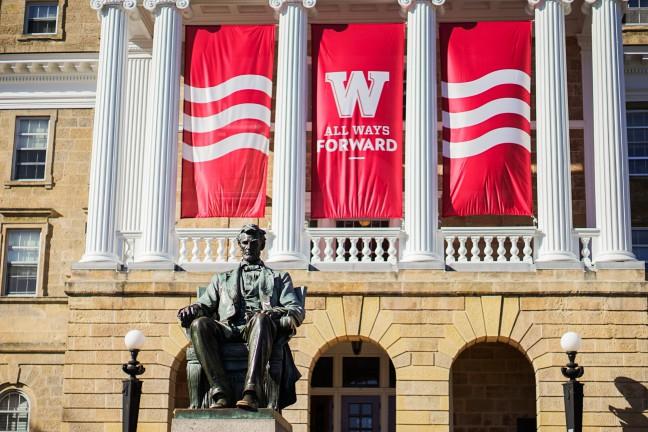University of Wisconsin is looking at increasing its non-need-based financial aid for students earlier in their academic career, but some say it is just another move in the “arms race” among schools competing for top students in the nation.
Historically, UW’s non-need-based aid, or merit aid, has sat at the lower end among Big Ten schools, according to Inside Higher Ed. The competitive higher education market, however, calls UW to adjust its financial aid policy to maintain its appeal to high-performing students, both in Wisconsin and out of state, Chancellor Rebecca Blank said in the article.
Steve Hahn, vice provost for enrollment management at UW, said currently the majority of aid given on campus is need-based. Merit scholarships, he said are often distributed at the college level. For example, Hahn said, the College of Letters and Science and College of Engineering all have their own scholarships to award, mostly to upperclassmen.
But Hahn said Blank is planning to find more dollars to invest in top-performing students earlier in their school years as well. The money for these scholarships will primarily come from gifts and donations the university receives to supplement the need-based-aids.
“In combination, the chancellor would like to raise the amount of merit aid that we can direct more upfront in the students’ career, in addition to the scholarships that we got more at the back end of the students’ career as juniors and seniors,” Hahn said.
Transcript: The Badger Herald sits down with Chancellor Rebecca Blank, Lori Berquam
But the measure has drawn criticism from Nicholas Hillman, a UW educational leadership and policy assistant professor, who says it is inconsistent with the mission of public universities.
Hillman said there are two issues with the institution’s attempt to increase merit aid.
The first problem is students who get non-need-based aid are more likely to attend college regardless of financial assistance, Hillman said. Yet there is still a portion of low-income students whose aid needs have not yet been fulfilled, he said.
“If you think about the bigger picture of the social benefit of awarding a student aid that goes beyond their financial need, it’s not only inefficient but also equitable because it’s disproportionately going to students who don’t need it,” Hillman said.
According to UW’s 2014-15 Common Data Set, on average, need-based aid fulfills 80 percent of an undergraduate student’s need.
The other problem Hillman raised is the market competition for enrollment will skew the institution’s purpose to serve all students.
“It fields into this whole arms race for prestige, it’s an enrollment management strategy that colleges use not because it serves their mission, but because it helps them be competitive in the higher education marketplace,” Hillman said.
UW must find a balance between spending money on the students who need it the most, and awarding the high-performing ones, Hillman said.
He also noted the university should question the entire premise that potential students are going elsewhere because UW cannot offer them a package competitive enough.
“Where are those numbers?” Hillman said. “Often times, you find solutions not because they can solve a problem, but because it’s convenient, because everybody else is doing it.”
Hahn said UW plans to address these concerns by collecting and synthesizing data to research the situation.
While they are still in the initial discussions of merit aid increases and nothing is determined yet, Hahn said enrollment officials plan to construct a survey at the end of this semester to get concrete data on why students decide to come to UW or not.
“Merit aid may or may not be among these [reasons],” Hahn said. “It very well might, but there might be other factors too that induce a student, even if they’re from Wisconsin, not to apply to UW.”
Besides students from Wisconsin, UW also enrolled many high-performing students from other states, Hahn said. Even with the tuition increase UW is still favorable among out-of-state students compared to its peers in the Big Ten, or other research universities in the country, he said.
UW-Madison’s out-of-state tuition will increase by $10,000 over next four years
Hahn said he believes the out-of-state students UW enrolls will continue to be high-quality and strong. But there has not yet been any calculation about the difference between merit aid to Wisconsin students and to out-of-state students.
Hahn said the university hopes the survey results, which is likely to begin when the class of 2020 enrolls in May, will shed light on the next steps of UW’s financial aid policy.
“Often merit aid and need based aid are used almost as if they were in opposition to each other, but whenever I think of this I think of aid for students, and I’m sure that our approach to students will always be an effective combination of both,” Hahn said.

















